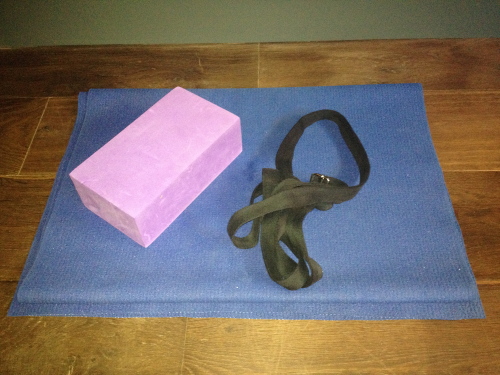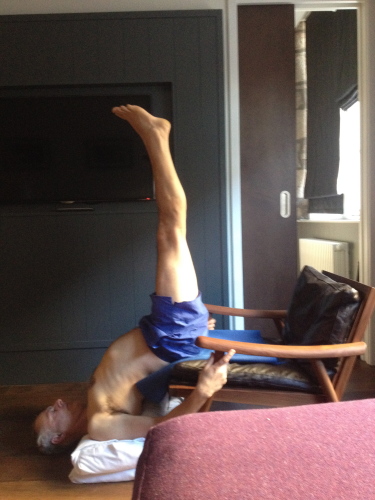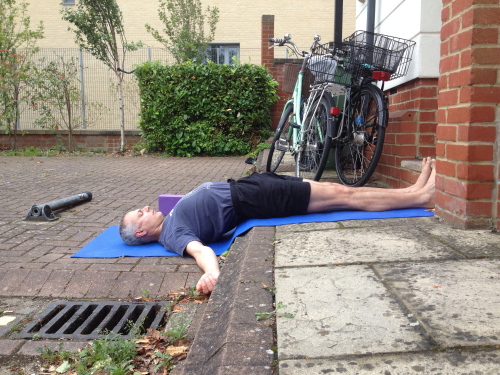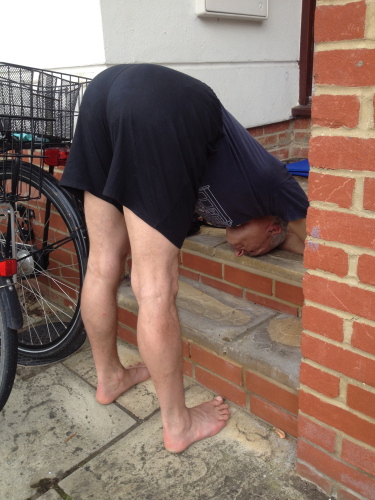Prop Agenda
by Arjun von Caemmerer
How many Iyengar Yoga practitioners does it take to change a light bulb? Just one…along with a trestle, a bolster, a chair, two blocks, four blankets and a strap. This joke, well-worn though it is by now, is thread with a truth. Albeit obliquely, it rightly links Yogacharya Sri BKS Iyengar to the props now commonly used in yoga practice. Iyengar developed these out of necessity, having encountered students who were unable to perform the classical āsanas (yoga postures) without significant distortions. Props are, therefore, one of the bonuses of his teaching experience.
It is illuminating to compare the difference in the prop requirements in the two seminal publications (each intended for use by the home practitioner) that bookend the life work of Sri BKS Iyengar, Light on Yoga (1965) and Yoga: The Path to Holistic Health (2008). In the Introduction to Light on Yoga, Iyengar states that “to perform [āsana] one needs a clean airy place, a blanket and determination, whilst for other systems of physical training one needs large playing fields and costly equipment. Āsanas can be done alone as the limbs of the body provide the necessary weights and counter-weights”. In the nearly 600 photographs in this book, not a single prop is depicted, although a few are mentioned in the text (for example, the recommendation to use the corner of two intersecting walls to help develop an accurate sense of alignment in Śirṣāsana, (headstand).
In contrast, the basic 20-week Course in The Path to Holistic Health requires the practitioner to have at their disposal a generous number of props: a mat, 5 wooden blocks, 4 bolsters, 3 blankets, 2 stools, 2 foam blocks, a bench, a rounded block, a chair, a strap, a bandage and access to a suitable wall. Clearly, many would-be yoga practitioners may have neither the resources to purchase, nor indeed the space to house, all of this equipment. It is of course feasible that some students might have access to a shared pool of props or to the facilities of a well-equipped yoga school.
The prospective home practitioner may need, therefore, to find a middle path between these two ends of the spectrum. It might be helpful here to return to basics: to clarify what props actually are, what purposes they serve, what hidden disadvantages they might entail, and, finally, which props could be considered essential for the home practitioner.
The dictionary definition of “prop” includes both its use as a noun: “a support, especially one not an integral part of the thing supported” and, as a verb: “to support or keep from falling”. Both of these definitions are of practical utility, and seem surprisingly consonant with the Sanskrit word dharma, about which Iyengar quotes from the Mahābhārata: “Patitam patantam patiṣyantam dhārayati iti dharmah. Dhāraṇat dharmaḥ ityāhaḥ”. “Dharma is that which supports, sustains, and upholds those who have fallen (physically, morally or spiritually), or those who are falling or about to fall”.
Yoga practice itself props the practitioner and, in the strictest sense, it could be argued that there is no ‘thing’ that is not a prop, as any ‘thing’ exists only in an interdependent relationship with all other things. This is evident in the different domains of practice where body, senses, breath, mind, intelligence and consciousness each support (and in their turn are supported by) all the other components.
Props have manifold purposes. Although I may refer to single examples in the next few paragraphs, the basic principles discussed can be generalized to the entire corpus of āsana.
First, props help physically support and stabilize—to ground—the practitioner in relation to the earth. In this sense (in the absence of a non-slip surface on which to practice) a sticky mat is the most fundamental prop. Second, props can assist with approaching the intent of a ‘classical’ āsana whilst minimising the unhealthy distortion that generally accompanies forcing a body that does not have the requisite movement into a shape. For example, Light on Yoga shows Trikoṇāsana (triangle posture) with the bottom palm flat on the floor behind the front leg. Using appropriate support (a block for the bottom palm) can reduce distortion in the neck and throat region and facilitate ease of breathing for those without sufficient mobility for the classical position. Because props can allow a modification of the classical āsana into one that is more easeful, they can also be helpful where energy might need to be conserved, for example in the low-energy state that follows infections or sometimes accompanies physiological states (such as menstruation). Further, they can help to maintain a difficult posture for sufficient time to fully and effectively marinate body, mind and breath in the āsana, so enabling the practitioner to access the benefits of āsanas that might otherwise remain elusive. This is well-illustrated by the previously mentioned 20-week course in The Path to Holistic Health, which includes supported versions of āsanas which are very difficult to do well in their unmodified form (such as Viparita Dandāsana, inverted staff pose, an intense backbend with headstand positioning).
But props have a purpose parallel—and just as important as that of developing more effective musculoskeletal and organic actions: they can help to develop sensation in parts of the body that are difficult to feel. Just as the variety of different āsanas help to bring hidden sensations to the surface, so too, props can act as amplifiers of sensation, allowing the apprehension of feelings that may be intellectually acknowledged but which are not readily perceived. For example, holding a block between the thighs in Tadāsana can help to cultivate a sense of relative right and left balance between the actions of the two legs, so facilitating evenness and a sense of alignment. Using the block can also assist in balancing the simultaneous movements intrinsic to this āsana (an upward and backward movement with the thigh muscles which is coupled with the downward and forward movement with the coccyx); and to feel the relatively more subtle action of drawing the inner leg upwards. That is, props can facilitate finding the correct sense of direction in the āsana.
For a mature practitioner, props can also permit a deeper exploration of the biomechanics and bioenergetics of the āsana. When different aspects of the āsana are deliberately varied through the use of a prop, the practitioner has an opportunity to study how the āsana is affected. For example, simply varying the block for the bottom hand in Trikoṇāsana (placed closer to the knee or closer to the ankle; turned to a higher or lower height; placed in front of or behind the leg etc) allows the practitioner to observe in each variation what different sensations emerge or diminish, which actions are required or become no longer necessary, where space is expanded or contracted, how the breath is altered, how the sense organs are affected and so on. Investigating and understanding these variables is an aspect of svādhyāya, self-study. The cultivation of such subjective understanding potentially allows a yoga teacher to employ those variations that might be indicated for the needs of a particular student. This is the basis for the skilful deployment of props in remedial or therapeutic yoga sequences.
It is essential to remember that props bring their own baggage. They can be expensive, bulky and unfriendly to the environment. Props—in common with any other tool—have their own learning requirements for safe and effective use. Blocks, for example, can be unstable. (The author had a significant injury to a thumb tendon that occurred overbalancing whilst teaching Ardha Chandrāsana with a tall block.) It takes time to learn to use a prop well and students need to have a clear idea of why the prop is being used in the first place. The input of an experienced teacher is invaluable here.
An āsana that is fully supported by props conserves bio-energy more effectively than the same posture done actively (as relatively less muscular action is required to maintain the posture). But, in my experience, supported postures, especially if held for a prolonged time, can be more problematic for those students with musculoskeletal weakness or instability, than the same āsana done actively. One example would be supported Setu Bhāndha Sarvāngāsana (pictured below). Some students who have a tendency to back pain cannot tolerate this āsana for long, or will experience pain when coming out of the posture. In contrast, these same students will often find that the less supported and more active posture is more relieving. This may be counter-intuitive as there is often a misconception that supported āsanas are necessarily going to be ‘easier’ than their more active counterparts.
Props need to be appropriate to the practitioner. For example, in order to rest the head on a support in the standing forward bend, Uttānāsana (see picture below) the practitioner’s height, ratio of leg length to torso, as well as their relative stiffness or flexibility will have to be taken into account. If used unnecessarily, props might not only block or inhibit the range of movement but also restrict the field of sensation. This potentially impoverishes the capacity to learn from a yoga practice. Props may also contribute a to a sense of dependence, at worst leading to a mental rigidity that sees the āsana as only able to be performed in a particular way.
If one of the intentions of yoga practice is to develop flexibility in mind and body, one cannot be overly prescriptive about which props are necessary for home practice. A short list of props suitable for home practice would include a mat, a belt and a block. Blankets are generally readily available, and can be rolled to approximate a bolster; chairs, too, can often be adapted for one’s use. These few props would generally allow the practitioner to practice a wide range of āsanas that might benefit from some external support (including standing postures, seated postures, forward bends, backbends, inversions and supine postures). But if the intention behind the practice is understood and the practitioner somewhat creative, the immediate environs can frequently also be adapted, using whatever is at hand: walls, balconies, tables etc.
Sadly, the yoga world is not immune to fad or fashion. It is worth recalling the wry admonition of the Hatha Yoga Pradipika: not through wearing the clothes of a yogi is yoga achieved (nor, in this context, by amassing the accoutrements of unnecessary props). The author recently travelled overseas—the constraints of space allowed the carriage of only mat, belt and block as props, but, as the accompanying photographs show, in this circumstance, necessity can again become the mother of invention.
 A basic set of home (or travelling) props: mat, belt and block
A basic set of home (or travelling) props: mat, belt and block
 Supported Sarvāngāsana using the hotel’s chair and pillows
Supported Sarvāngāsana using the hotel’s chair and pillows
 Setu Bhandha Sarvāngāsana: lack of indoor space made this necessary
Setu Bhandha Sarvāngāsana: lack of indoor space made this necessary
 Supported Uttānāsana: using steps for a headrest
Supported Uttānāsana: using steps for a headrest
 The gunas are displayed in the diagram above like this because, just as yellow, red and blue as the 3 primary colours form the basis for the infinite range of colours on a colour spectrum, sattva, rajas and tamas form the basis for all of prakrti, including our bodies & minds (and psychological make-up). Another way of looking at our yoga practice is as an attempt to reduce tamas and rajas, and increase sattva.
The gunas are displayed in the diagram above like this because, just as yellow, red and blue as the 3 primary colours form the basis for the infinite range of colours on a colour spectrum, sattva, rajas and tamas form the basis for all of prakrti, including our bodies & minds (and psychological make-up). Another way of looking at our yoga practice is as an attempt to reduce tamas and rajas, and increase sattva. As shown in the diagram the tattvas start with the most subtle layers of the mind and evolve through our various organs and senses, to the gross elements of nature.
As shown in the diagram the tattvas start with the most subtle layers of the mind and evolve through our various organs and senses, to the gross elements of nature. A basic set of home (or travelling) props: mat, belt and block
A basic set of home (or travelling) props: mat, belt and block Supported Sarvāngāsana using the hotel’s chair and pillows
Supported Sarvāngāsana using the hotel’s chair and pillows
 Setu Bhandha Sarvāngāsana: lack of indoor space made this necessary
Setu Bhandha Sarvāngāsana: lack of indoor space made this necessary
 Supported Uttānāsana: using steps for a headrest
Supported Uttānāsana: using steps for a headrest